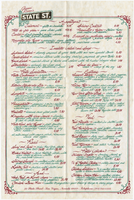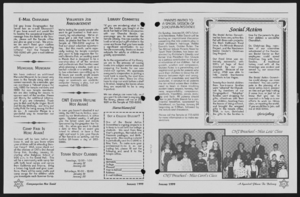Search the Special Collections and Archives Portal
Search Results
Ffolliott "Fluff" LeCoque Papers
Identifier
Abstract
Collection is comprised of Ffolliott "Fluff" LeCoque's professional and personal papers (1879-2015), documenting her life and career working as a dancer and later as company manager for Las Vegas entertainment productions; most notably the long-running Jubilee! show produced by Donn Arden for the MGM Grand and Bally's Hotel-Casinos. Materials include personal letters, drawings, professional papers, newspaper clippings, photographs, magazines, commericially produced sheet music, and related ephemera.
Archival Collection

Gianni Russo's State St., menu, circa 1980s
Date
Archival Collection
Description
Text

Charles Guy interview, 1995: transcript
Date
Archival Collection
Description
Guy begins by talking about his birth in Brazil, Indiana, his early work selling Civilian Conservation Corps magazine subscriptions, and his travels across the United States before arriving in Boulder City, Nevada in 1938. Next, Guy recalls his early memories of Boulder City, the Las Vegas Wash, and his work at the Boulder Beach campgrounds at Lake Mead Recreation Area and in Overton, Nevada. Guy also discusses the campgrounds' working conditions, entertainment, access to amenities, and work associates. Afterwards, Guy talks about his time as a railroad worker in Indiana and Las Vegas, Nevada, Block 16 in Las Vegas, Las Vegas entertainers, working as a volunteer fire fighter, and anecdotes about people in his personal life.
Text

Mario Sandoval interview, December 6, 2018: transcript
Date
Archival Collection
Description
Interviewed by Claytee White. Mario and his six siblings were reared by a single mother who taught him all of the family recipes. Moving to Las Vegas at four years of age Mario remembers moving into a black neighborhood where the family was not welcomed. All windows in their home were broken into the first night. The family moved the next day. Though the new house was still in an African American neighborhood, they were protected by Vera, their black babysitter. Mario developed the intense work ethic of his mother, and after working in several strip casinos, found his home at the Horseshoe, today's Binion's. He has been there for 33 years; first as a busboy and then becoming a waiter. He is a Culinary Union trained shop student who picketed his beloved work place for ten months during a 1980's labor dispute. His work in life and union benefits have made his a very good life.
Text

Moises Denis interview, January 11, 2019: transcript
Date
Archival Collection
Description
Interviewed by Marcela Rodriguez-Campo. Laurents Bañuelos-Benites, Maribel Calderón, and Barbara Tabach also participate in the questioning. Moises "Mo" Denis is a Cuban American born in Brooklyn, New York. He served as the first Latino Majority Leader in the Nevada State Senate and has been involved in public service for over 30 years. As a leader in the Church of Latter Day Saints and his involvement with supporting Latinx initiatives, Mo has been able to increase the representation of Latinos in politics and support educational reform. While early on his family moved around a lot, they finally settled in Las Vegas and have continued to grow their family. Mo is a Rancho High School alum and went on to graduate from Brigham Young University as a music major. He first started his career by opening a music store, but later began working in the tech industry. Eventually, through his involvement in the PTA, Mo was appointed to serve on the Clark County Library Board. There he was involve
Text

Transcript of interview with Ellen DeLand by Dennis McBride, January 19-20, 1996
Date
Archival Collection
Description
Ellen DeLand was born on April 1, 1931 and went to Santa Monica High School. She was very active in the Las Vegas LGBT community. She was interviewed January 19, 1996.
Text

Theresa Thomas interview, March 13, 1995: transcript
Date
Archival Collection
Description
Thomas discusses her early life in Thistle, Utah before moving to Las Vegas, Nevada in approximately 1931, where her father worked on the Hoover Dam (Boulder Dam) construction. Thomas then talks about her early schooling in Boulder City, Nevada, her experiences as a swing and dance band musician, Block 16 in the Clark Las Vegas Townsite, and her memories of Las Vegas hotels and casinos. Other subjects Thomas covers include Las Vegas entertainers, entertainment venues, and women in the music industry during the 1930s.
Text

Transcript of interview with Freddie Glusman by Barbara Tabach, October 29, 2015
Date
Archival Collection
Description
In this interview Glusman discusses his early memories of being raised in Vancouver, Canada and how he ended up in Las Vegas. He reflects on how he first got his start in the town and his early dealings with casinos and their owners while he was working as a carpet and drapery salesman and while working for Fabulous Magazine. Glusman explains how he started his restaurant and tells about the people he encountered while doing this that where significant to both the Jewish community and Las Vegas as a whole. He recounts stories that include such people as Meyer Lansky, Al Sachs, and Moe Dalitz.
Text

Interview with Lafayette "Lafe" H. Dana, June 20, 2005
Date
Archival Collection
Description
Text

